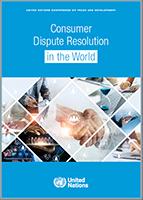
Access to and availability of dispute resolution and redress mechanisms are a basic legitimate need of consumers, as recognised by the United Nations Guidelines for Consumer Protection.
However, well functioning dispute resolution and redress mechanisms are not yet readily accessible or available in many parts of the world.
Amongst the calls to action for wider and expedited implementation of effective dispute resolution and redress mechanisms is the aspiration, expressed by various countries, for the development of internationally coordinated consumer dispute resolution (CDR) systems.
In the context of how CDR has been evolving and the ongoing international efforts to implement effective mechanisms, this report seeks to take stock of the latest developments in further advancing the consumer protection agenda relating to CDR.
This report aims to answer three questions:
-
What are the legal, policy and institutional frameworks for CDR in selected countries and territories, and at the regional level?
-
What challenges do policymakers and practitioners face with regards to the design, development, implementation, operation and enforcement of CDR?
-
What are the best practices of selected CDR models and schemes that make them effective, and what lessons can be drawn to improve CDR?
To answer these questions, a mixed methods approach was employed to gather primary data from the field and desk-based secondary data.
With regards to the primary data, UNCTAD conducted questionnaire surveys and interviews with various stakeholder groups.
Overall, datasets were derived from 27 countries across six continents. Based on the findings and analyses, this report discusses the policy implications and summarizes the proposed policy recommendations.


